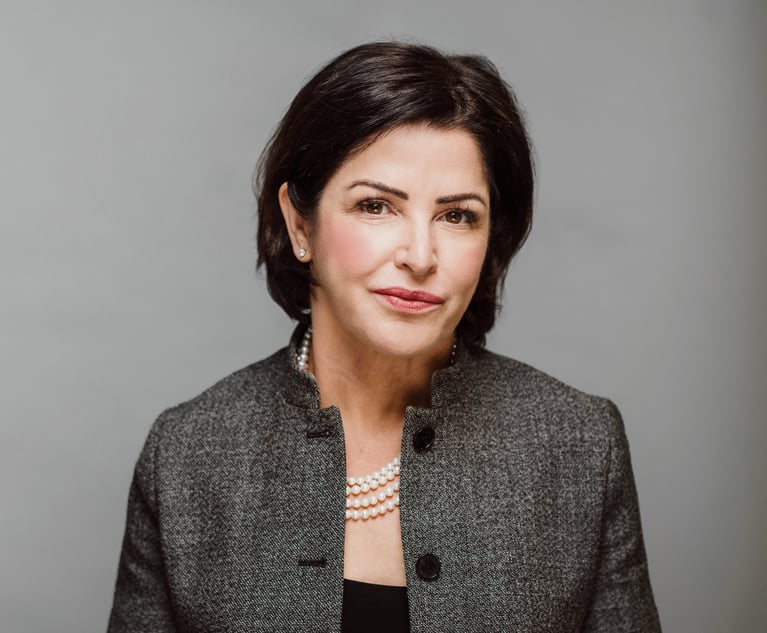The Legal Sector Must Ensure COVID-19 Does Not Create More Barriers to Diversity
Tiernan Brady, global director of inclusion at Clifford Chance, says it is easy to have values in good times, but in challenging times we show whether our commitment to these values is real.
May 26, 2020 at 06:14 AM
6 minute read
 The legal sector needs to be strategic and proactive in making sure that inclusion does not emerge as an additional victim in this terrible moment.
The legal sector needs to be strategic and proactive in making sure that inclusion does not emerge as an additional victim in this terrible moment.
Some say COVID-19 is the great social leveller that impacts us all equally. It just isn't true.
Across law firms and society more broadly the impacts of COVID-19 and how we have responded to it are having a profoundly different set of outcomes for different groups. If these impacts are left unaddressed they will further exacerbate barriers to building more inclusive workplaces and societies. The legal sector needs to be strategic and proactive in making sure that inclusion does not emerge as an additional victim in this terrible moment.
We can sadly, and clearly, see that at a medical level COVID-19 is having a disproportionate impact on people from certain ethnicities. This impact is further amplified in many countries by the poorer socio-economic outcomes for many of these populations. The legal sector needs to be thinking now how it can intervene to support these groups both within our firms and in society.
We need to understand and tackle the disproportionate impact it may have on access to schooling and university acceptances. Inclusion at its most basic level requires the absence of exclusion. This will not simply iron itself out as we eventually return to a new normal — it requires targeted and tailored interventions now.
We are not working from home. Working from home is when you get to avoid the office and your commute, schools are open, day care and wider family are available to assist you. That is not what is happening now.
Our work and personal lives have totally merged instantaneously and all in the middle of a global pandemic. All the old guidelines on how to work from home pale into insignificance in the face of this reality.
For LGBT+ people, many face the anxiety of having to move home and in doing so move back into the closet, not just into their old bedroom. We also know that far too many LGBT+ people feel they cannot be out at work so homes have had to be denuded of any signs that would give the game away on a video call or meeting with colleagues or clients.
It is the impact on our family lives that is probably most visible to all of us as we glide from one video conference to another. Many of us are raising children or taking care of elderly parents and other vulnerable family members. It is always lovely to see children bounce through a client call and we all laugh and genuinely enjoy it, but it belies the pressure that is being faced by so many as we try to balance everything in real time.
There is a significant threat that this crisis will also have a gendered impact as a result. We would like to think that we live in a perfect world where parenting and family duties are carried out equally but we shouldn't kid ourselves.
The demands of family will undoubtedly fall disproportionately on women. We can admire that problem and say it shouldn't be so but that won't change it. As the crisis and it's impact roll on through the year people will be faced with increasing choices between work and family. The anxiety that many feel already as they contemplate whether they should take extended leave and what impact will that have on their career is all too real.
Law firms and clients need to get ahead of this. Leadership teams need to tell their colleagues that they understand these pressures and will do everything in their power to support the choices people are faced with and that those choices will not be held against them at a later date.
There needs to be a new found understanding and flexibility with each other based on empathy and that simplest of values — kindness. No amount of guidelines will be as effective as the simple advice our grannies gave us to be nice to each other. It turns out that they are smarter than the best change management consultants for the needs of this moment.
There has been endless talk and seminars on the importance of inclusion, purpose and values in recent years. It is easy to have values in good times. It is only in challenging times that we show whether or not our commitment to these values is real. Inclusion is not a luxury item that can be put in a drawer until after a crisis. Values that we dismiss in times of crisis aren't values at all — they are merely fridge magnets or brand aware t-shirts.
Here's the thing — we employ smart people and they can easily tell the difference between a value and a slogan. If we truly believe what we profess on inclusion then we will understand now is when inclusion both faces serious challenges and provides key solutions to our way through this time.
Tiernan Brady is the global head of inclusion at Clifford Chance. He joined the firm in 2019 after serving as the executive director of the Equality Campaign, the successful Australian marriage equality campaign, before which he was the political director of Yes Equality, the successful Irish campaign for marriage equality.
Read more
Closing the Gender Gap Must Remain a Law Firm Priority, Even in a Crisis
New Law Leaders Call On GCs To Maintain Diversity Commitments Amid Pandemic
The Legal Industry's Existential Doubts Go Beyond the Coronavirus
This content has been archived. It is available through our partners, LexisNexis® and Bloomberg Law.
To view this content, please continue to their sites.
Not a Lexis Subscriber?
Subscribe Now
Not a Bloomberg Law Subscriber?
Subscribe Now
NOT FOR REPRINT
© 2025 ALM Global, LLC, All Rights Reserved. Request academic re-use from www.copyright.com. All other uses, submit a request to [email protected]. For more information visit Asset & Logo Licensing.
You Might Like
View All

Pallas Partners Founder On the Disputes Trends to Look Out For in 2025
4 minute read
What to Expect From Teresa Ribera, the EU‘s New Competition Commissioner
6 minute readTrending Stories
- 1Conversation Catalyst: Transforming Professional Advancement Through Strategic Dialogue
- 2Trump Taps McKinsey CLO Pierre Gentin for Commerce Department GC
- 3Critical Mass With Law.com's Amanda Bronstad: 700+ Residents Near Ohio Derailment File New Suit, Is the FAA to Blame For Last Month's Air Disasters?
- 4Law Journal Column on Marital Residence Sales in Pending Divorces Puts 'Misplaced' Reliance on Two Cases
- 5A Message to the Community: Meeting the Moment in 2025
Who Got The Work
J. Brugh Lower of Gibbons has entered an appearance for industrial equipment supplier Devco Corporation in a pending trademark infringement lawsuit. The suit, accusing the defendant of selling knock-off Graco products, was filed Dec. 18 in New Jersey District Court by Rivkin Radler on behalf of Graco Inc. and Graco Minnesota. The case, assigned to U.S. District Judge Zahid N. Quraishi, is 3:24-cv-11294, Graco Inc. et al v. Devco Corporation.
Who Got The Work
Rebecca Maller-Stein and Kent A. Yalowitz of Arnold & Porter Kaye Scholer have entered their appearances for Hanaco Venture Capital and its executives, Lior Prosor and David Frankel, in a pending securities lawsuit. The action, filed on Dec. 24 in New York Southern District Court by Zell, Aron & Co. on behalf of Goldeneye Advisors, accuses the defendants of negligently and fraudulently managing the plaintiff's $1 million investment. The case, assigned to U.S. District Judge Vernon S. Broderick, is 1:24-cv-09918, Goldeneye Advisors, LLC v. Hanaco Venture Capital, Ltd. et al.
Who Got The Work
Attorneys from A&O Shearman has stepped in as defense counsel for Toronto-Dominion Bank and other defendants in a pending securities class action. The suit, filed Dec. 11 in New York Southern District Court by Bleichmar Fonti & Auld, accuses the defendants of concealing the bank's 'pervasive' deficiencies in regards to its compliance with the Bank Secrecy Act and the quality of its anti-money laundering controls. The case, assigned to U.S. District Judge Arun Subramanian, is 1:24-cv-09445, Gonzalez v. The Toronto-Dominion Bank et al.
Who Got The Work
Crown Castle International, a Pennsylvania company providing shared communications infrastructure, has turned to Luke D. Wolf of Gordon Rees Scully Mansukhani to fend off a pending breach-of-contract lawsuit. The court action, filed Nov. 25 in Michigan Eastern District Court by Hooper Hathaway PC on behalf of The Town Residences LLC, accuses Crown Castle of failing to transfer approximately $30,000 in utility payments from T-Mobile in breach of a roof-top lease and assignment agreement. The case, assigned to U.S. District Judge Susan K. Declercq, is 2:24-cv-13131, The Town Residences LLC v. T-Mobile US, Inc. et al.
Who Got The Work
Wilfred P. Coronato and Daniel M. Schwartz of McCarter & English have stepped in as defense counsel to Electrolux Home Products Inc. in a pending product liability lawsuit. The court action, filed Nov. 26 in New York Eastern District Court by Poulos Lopiccolo PC and Nagel Rice LLP on behalf of David Stern, alleges that the defendant's refrigerators’ drawers and shelving repeatedly break and fall apart within months after purchase. The case, assigned to U.S. District Judge Joan M. Azrack, is 2:24-cv-08204, Stern v. Electrolux Home Products, Inc.
Featured Firms
Law Offices of Gary Martin Hays & Associates, P.C.
(470) 294-1674
Law Offices of Mark E. Salomone
(857) 444-6468
Smith & Hassler
(713) 739-1250









